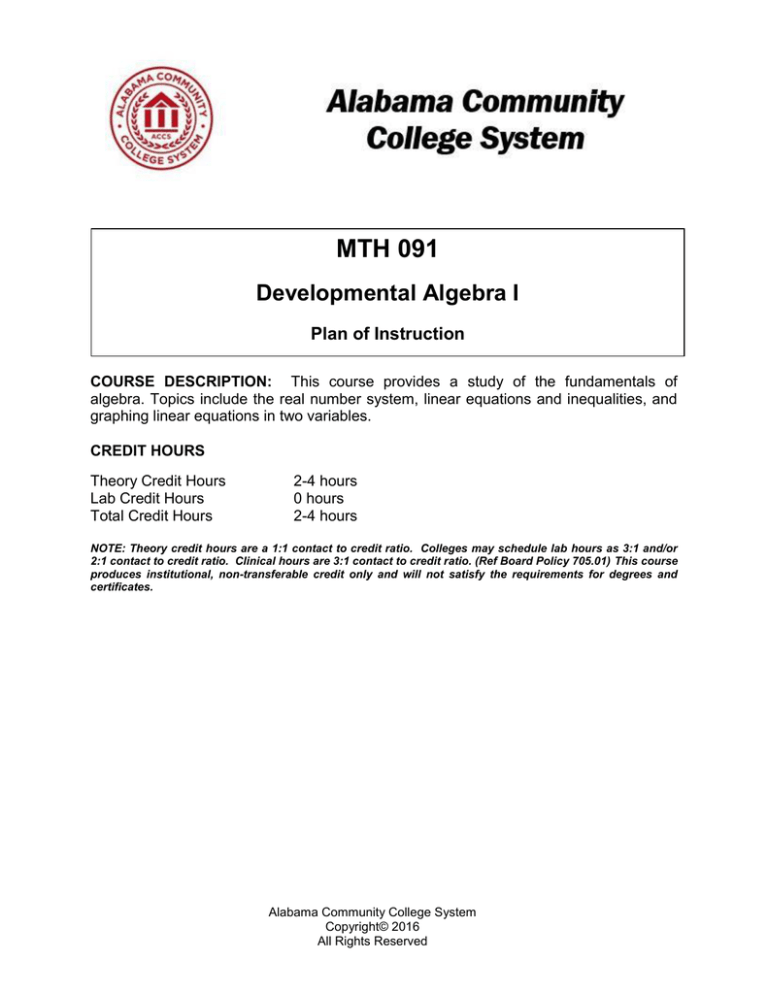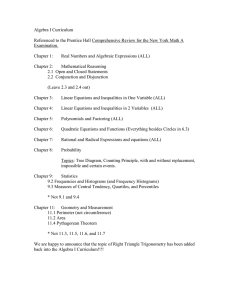
MTH 091
Developmental Algebra I
Plan of Instruction
COURSE DESCRIPTION: This course provides a study of the fundamentals of
algebra. Topics include the real number system, linear equations and inequalities, and
graphing linear equations in two variables.
CREDIT HOURS
Theory Credit Hours
Lab Credit Hours
Total Credit Hours
2-4 hours
0 hours
2-4 hours
NOTE: Theory credit hours are a 1:1 contact to credit ratio. Colleges may schedule lab hours as 3:1 and/or
2:1 contact to credit ratio. Clinical hours are 3:1 contact to credit ratio. (Ref Board Policy 705.01) This course
produces institutional, non-transferable credit only and will not satisfy the requirements for degrees and
certificates.
Alabama Community College System
Copyright© 2016
All Rights Reserved
Developmental Studies
Developmental Algebra I
MTH 091
PREREQUISITE COURSES
MTH 090 or appropriate mathematics placement score.
CO-REQUISITE COURSES
As determined by college.
COMPETENCIES
Solve mathematical problems involving real numbers.
Solve problems involving linear equations and inequalities.
Graph linear equations in two variables.
INSTRUCTIONAL GOALS
Cognitive – Comprehend principles and concepts related to developmental
algebra.
Psychomotor – There are no psychomotor goals associated with this course.
Affective – There are no affective goals associated with this course.
ACCS Copyright© 2016
All Rights Reserved
2
Developmental Studies
Developmental Algebra I
MTH 091
STUDENT LEARNING OUTCOMES
MODULE A – REAL NUMBER SYSTEM
COMPETENCY A1.0 - Solve mathematical problems involving real numbers.
LEARNING OBJECTIVES
A1.1 Define terms associated with algebra.
A1.2 Perform operations on signed numbers.
A1.3 Apply the properties of real numbers.
A1.4 Evaluate and simplify algebraic expressions.
A1.5 Translate word phrases into algebraic expressions.
MODULE A TOPICS
Review of terms and definitions
Operations on signed numbers
- Fractions
- Decimals
- Absolute values
- Exponents
Order of operations
Real numbers and their properties
- Commutative
- Associative
- Distributive
- Identity
- Inverse
Algebraic expressions
- Evaluating
- Simplifying
- Translating
ACCS Copyright© 2016
All Rights Reserved
KSA
Indicators
1
2
2
2
2
3
Developmental Studies
Developmental Algebra I
MTH 091
MODULE B – LINEAR EQUATIONS AND INEQUALITIES
COMPETENCY B1.0 - Solve problems involving linear equations and inequalities.
LEARNING OBJECTIVES
B1.1 Solve equations and inequalities involving one step.
B1.2 Solve equations and inequalities involving multiple steps.
B1.3 Solve literal equations for a specified variable.
B1.4 Graph solutions of inequalities.
B1.5 Introduction to compound inequalities.
B1.6 Solve application problems involving linear equations.
MODULE B TOPICS
Solving equations and inequalities
- One step
- Multiple steps
- Literal equations
Graphing inequalities
Compound inequalities
Applications
KSA
Indicators
2
2
2
2
2
3
MODULE C – GRAPHING LINEAR EQUATIONS IN TWO VARIABLES
COMPETENCY C1.0 – Graph linear equations in two variables.
LEARNING OBJECTIVES
C1.1 Graph ordered pairs on a rectangular coordinate system.
C1.2 Identify solutions to linear equations in two variables.
C1.3 Identify X and Y intercepts.
C1.4 Graph linear equations in two variables using a variety of method
C1.5 Find the slope of a line.
MODULE C OUTLINE
Ordered pairs
- Define
- Identify
- Graph
- As solutions
Lines
- Graphing
- X and Y intercepts
- Slope
ACCS Copyright© 2016
All Rights Reserved
KSA
Indicators
2
2
2
2
2
4
Developmental Studies
Developmental Algebra I
MTH 091
LEARNING OUTCOMES TABLE OF SPECIFICATIONS
The table below identifies the percentage of learning objectives for each module. Instructors should
develop sufficient numbers of test items at the appropriate level of evaluation.
Limited
Knowledge and
Proficiency
KSA
Module A
Module B
Module C
ACCS Copyright© 2016
All Rights Reserved
1
20%
Moderate
Knowledge
and
Proficiency
2
80%
83%
100%
Advanced
Knowledge
and
Proficiency
3
Superior
Knowledge
and
Proficiency
4
17%
5
Developmental Studies
Developmental Algebra I
Indicator Key Terms
1
Limited
Knowledge
and
Proficiency
2
Moderate
Knowledge
and
Proficiency
3
Advanced
Knowledge
and
Proficiency
4
Superior
Knowledge
and
Proficiency
A
Affective
Objective
ACCS Copyright© 2016
All Rights Reserved
MTH 091
Learner’s Knowledge, Skills and Abilities
Description
Recognize basic information about the subject including terms
and nomenclature.
Students must demonstrate ability to recall information such as
facts, terminology or rules related to information previously
taught.
Performs simple parts of the competency. Student requires
close supervision when performing the competency.
Distinguish relationships between general principles and facts.
Adopts prescribed methodologies and concepts.
Students must demonstrate understanding of multiple facts
and principles and their relationships, and differentiate between
elements of information. Students state ideal sequence for
performing task.
Performs most parts of the competency with instructor
assistance as appropriate.
Examines conditions, findings, or other relevant data to select an
appropriate response.
The ability to determine why and when a particular response is
appropriate and predict anticipated outcomes.
Students demonstrate their ability to seek additional information
and incorporate new findings into the conclusion and justify their
answers.
Performs all parts of the competency without instructor
assistance.
Assessing conditions, findings, data, and relevant theory to
formulate appropriate responses and develop procedures for
situation resolution. Involves higher levels of cognitive
reasoning.
Requires students to formulate connections between relevant
ideas and observations.
Students apply judgments to the value of alternatives and select
the most appropriate response.
Can instruct others how to do the competency.
Performs competency quickly and accurately.
Describes learning objectives that emphasize a feeling tone, an
emotion, or a degree of acceptance or rejection.
Objectives vary from simple attention to selected phenomena to
complex but internally consistent qualities of character and
conscience.
Expressed as interests, attitudes, appreciations, values, and
emotional sets or biases.
6


